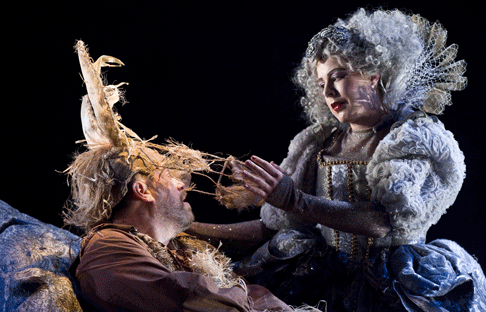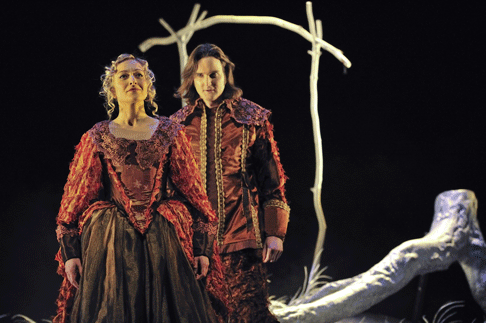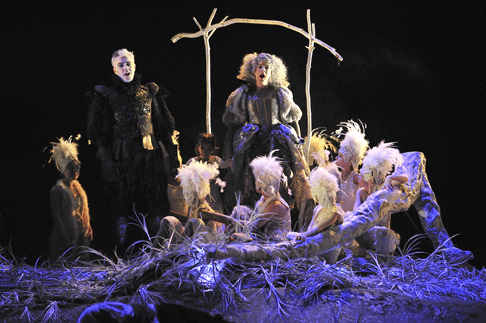15 Mar 2010
A Midsummer Night’s Dream by ETO
A silvery tree stretched its gnarled branches across the moonlit stage, and from the briar and bush spiky, feathered fairies wriggled and crept, intent on mischief and malevolence.

A silvery tree stretched its gnarled branches across the moonlit stage, and from the briar and bush spiky, feathered fairies wriggled and crept, intent on mischief and malevolence.
Joanna Parker’s simple single-set design for this revival of James Conway’s thoughtful production was in some ways the star of the show. Bathed in ultramarine gleams, the twisted tendrils tripped and tangled the confused lovers; there would be no sweet dreams in this enchanted wood, just nocturnal nightmares and strange imaginings.
From the haunted shadows emerged Jonathan Peter Kenny’s Oberon, a haughty warlord, clad in black, strutting proudly and contemptuously through his midnight kingdom. Kenny’s timbre was sweet and eerie, but the perennial problem of balance in the duets between the fairy monarchs was not overcome, and Oberon – lacking power and clarity of diction – was somewhat overshadowed by his tempestuous Tytania. As the Fairy Queen, Gillian Ramm’s bright voice shone, matching the shimmers of her silvery gown. The brilliance of her upper range pierced like a moon beam through the night sky, and it was no wonder that that beauty of her chain of falling thirds, ‘I how I love thee’, won the ass-headed Bottom’s heart.
The four lovers all gave solid individual performances, but there was little dramatic distinction between them – perhaps this is an inherent weakness of the score, for the lovers often share the same predominant melodic material, rising and falling scales. Most impressive was Robert Davies as Demetrius; he used both the words and vocal colour effectively to establish character. Niamh Kelly (Hermia) and Laura Mitchell (Helena) were tidily matched, and Michael Bracegirdle conveyed the yearning and urgency of Lysander’s passion.
The final act often lacks the intensity of the night-time meanderings of Acts 1 and 2, so it was pleasing here to see coherence maintained. For once, the rude mechanicals’ amateur dramatics did not feel like a redundant add-on, a gratuitous send-up originating from Peter Pears’ drag impersonation of Joan Sutherland. The pace was well-sustained, physical movements deftly choreographed, and the lunacy of the proceedings kept just the right side of farce. Andrew Slater, as Bottom, sang warmly and surely throughout, while Mark Wilde (Flute) demonstrated confident comic timing and a sharp awareness of the impact of small gestures, musical and dramatic. Mayhem was balanced by majesty, Nicholas Lester’s Theseus and Lise Christensen’s Hippolyta injecting some solemnity into the proceedings. Similarly, the arrangement of the lovers at the foot of the performing platform, and their involvement in the concluding dance, lent an air of harmony and unity to the scene.
The fairies were less successful. Owing to the exigencies of touring, four young female sopranos were joined by a countertenor, and supplemented by eight local boys and girls. A little uncertain and hesitant, this mixed voice medley could not recreate the uncanny, ethereal timbre of a band of goblin brothers. In contrast, David Gooderson’s Puck was assured, his spoken text expertly and chillingly delivered. Just one query: why did he spend the evening with his arms taped to his side?
 Andrew Slater as Bottom and Gillian Ramm as Tytania
Andrew Slater as Bottom and Gillian Ramm as Tytania
In this opera, so much depends on the orchestral fabric, and it was evident from the opening glissandi sweeps, that the instrumentalists, under the skilful baton of Michael Rosewell would expertly lull us into the world of dreams, shimmering and enticing us with colours of enchantment.
 Lise Christensen as Hippolyta and Nicholas Lester as Theseus
Lise Christensen as Hippolyta and Nicholas Lester as Theseus
At the final curtain, true love and clear sight were thankfully restored. Slipping his arms free from the ropes that bound him, Puck assured us that all was now mended: “Give me your hands if we be friends, And Robin shall restore amends.” The captivated audience was glad to oblige.
Claire Seymour
 Jonathan Peter Kenny as Oberon and Gillian Ramm as Tytania
Jonathan Peter Kenny as Oberon and Gillian Ramm as Tytania